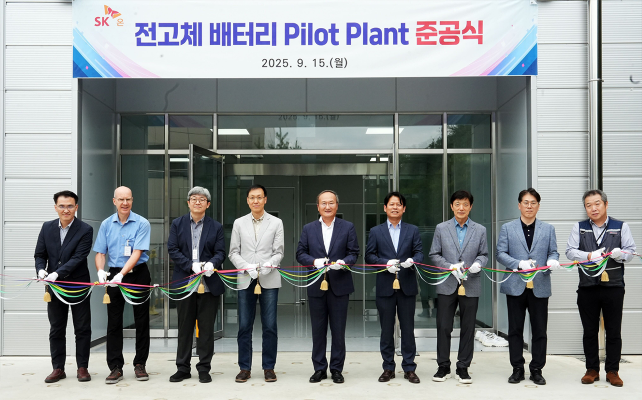Developing sulfide-based all-solid-state batteries and lithium-metal batteries

SK On President and CEO Seok-hee Lee (center), SK On Chief Technology Officer Jang-weon Rhee (fourth from left), Head of SK On Future Technology Institute Ki-soo Park (sixth from left), Country Manager of Solid Power Korea Andreas Maier (second from left) and other guests attend the ribbon cutting ceremony for SK On’s all-solid-state battery pilot plant completion at SK On Future Technology Institute in Daejeon on September 15, 2025.
SK On, a leading global battery and trading company, announced the completion of its pilot plant for all-solid-state batteries (ASSBs) in South Korea, marking a key step in its push to commercialize next-generation batteries by 2029.
SK On, part of South Korea’s second largest conglomerate SK Group, held the completion ceremony of its ASSB pilot plant at the SK On Institute of Future Technology in Daejeon, about 150 kilometers south of Seoul, on Sept. 15.
SK On CEO & President Seok-hee Lee and Head of the Institute of Future Technology Ki-soo Park were among the attendees, along with Andrea Maier, head of Solid Power Korea. SK On and Solid Power have been collaborating on ASSB researches since last year.
“This pilot plant will serve as a cornerstone for SK to leap forward as a strong and resilient company in addressing any changes in business environment,” Lee said. “We aim to remain at the forefront of commercializing all-solid-state batteries to accelerate electrification.”
SK On plans to commercialize its ASSBs by 2029, one year ahead of its original target. The company initially aims to commercialize ASSBs with an energy density of 800Wh/L, with a long-term goal of reaching 1,000Wh/L.
SK On said its 4,600-square-meter (50,000 sq. ft.) pilot plant uses its own “Warm Isostatic Press (WIP)-free” technology for ASSB development, making it the first in South Korea to apply such solutions.
A WIP technology is a next-generation pressing process that applies uniform pressure to electrodes at elevated temperatures (25–100 °C) to improve density and performance. To retain the advantages of the WIP process while addressing its shortcomings for better productivity, SK On leveraged its unique cell design and normal pressing methods. Specifically, the company optimized the mixing of battery materials, such as active materials and conductive additives, as well as the electrode composition, reducing internal resistance within the electrodes. Reduced resistance helps minimizes heat generation.
Furthermore, SK On improved the bonding between electrodes and solid electrolytes, and optimized pressing conditions to reduce interfacial resistance.
Subscribe to our newsletter & stay updated.